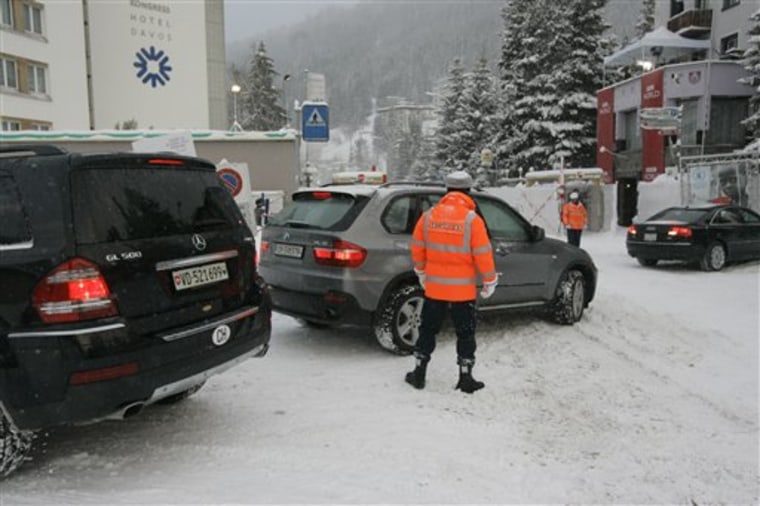Climate change will be among the major issues at this year's meeting of the world's business and political elite in the Swiss Alps and they can start by confronting their own carbon footprint.
Hundreds of participants in the World Economic Forum will land in private planes as large as Boeing 767s and travel to the secluded winter resort of Davos in helicopters, limousines, official buses or rented sport utility vehicles.
While some will take advantage of different programs to reduce greenhouse gases or use Switzerland's train network, one of the world's best developed, the annual meeting will demonstrate how such global meetings contribute to the problem of greenhouse gases.
Andre Schneider, chief operating officer of the Geneva-based WEF, said the five-day meeting produces about 7,500 U.S. tons (6,800 metric tons) of carbon emissions, which are widely regarded as being a main cause of global warming. The figure equates to the amount released over a whole year by 1,250 passenger cars or 900 homes.
The 38-year-old Forum is trying to shrink its carbon footprint this time around by offering free transport from the Zurich airport in one of 94 Audi A8s — including 12 equipped with heavy armor — that run on low-emission biodiesel fuel.
Some 150 participants are expected to use the service.
But many of the 2,500 politicians and business leaders attending the summit will make their way to Davos by more traditional — and dirtier — means of transportation.
The Zurich airport expects about 900 additional landings and takeoffs during the event, while Davos is preparing for a daily influx of 20 helicopters. There are also separate plans for the transport of state guests, which will include U.S. Secretary of State Condoleeza Rice, Pakistani President Pervez Musharraf and British Prime Minister Gordon Brown.
17,000 solar cookers to offset emissions
Forum spokesman Matthias Luefkens said up to 70 percent of emissions caused by the Forum will be offset through a program that will send 17,000 solar cookers to northwest China's Shanxi province, an impoverished region that has suffered extensive desertification and water and soil loss.
The voluntary program urges participants to pay $28 for each ton of CO2 released into the atmosphere during their flights. That equates to a $25 donation for a businessman or politician arriving from London; $62 from Moscow; and $168 from New York.
Luefkens said the Forum already has paid the emissions costs for all its staff, who were proudly wearing "I am offset" pins as they greeted arrivals on Tuesday.
While the program may help balance the global costs of increased flight and automobile traffic, any surge in local greenhouse gas emissions remains a sensitive topic in Switzerland. The country has been trying to deal with shrinking glaciers, warmer temperatures at Alpine resorts and increasing numbers of floods, and has spent billions on an unprecedented tunnel project aimed at moving pollution-rich trucks off its highways.
Local food and faraway lobsters
The environmental cost of the Davos event also highlights the, perhaps unavoidable, inconsistencies that come with a global meeting that seeks to foster real dialogue on the most pressing planetary problems.
The Forum's sessions include "Progress on Climate Change," featuring Rajendra Pachauri, chairman of the Nobel Peace Prize-winning U.N. body on global warming; "Beyond Kyoto: Is Collaboration Possible?" which deals with emissions-reducing programs after 2012; and "Combining Solutions to Extreme Poverty and the Climate Crisis," a discussion between U2 frontman Bono and Nobel co-winner Al Gore.
One meal with best-selling author Alice Waters focuses on locally sourced foods, which are being promoted as a solution to rising carbon costs from food deliveries being shipped around the world.
But three larger parties alone will require some 450 lobsters — a delicacy in a landlocked country at an elevation of 5,000 feet above sea level.
